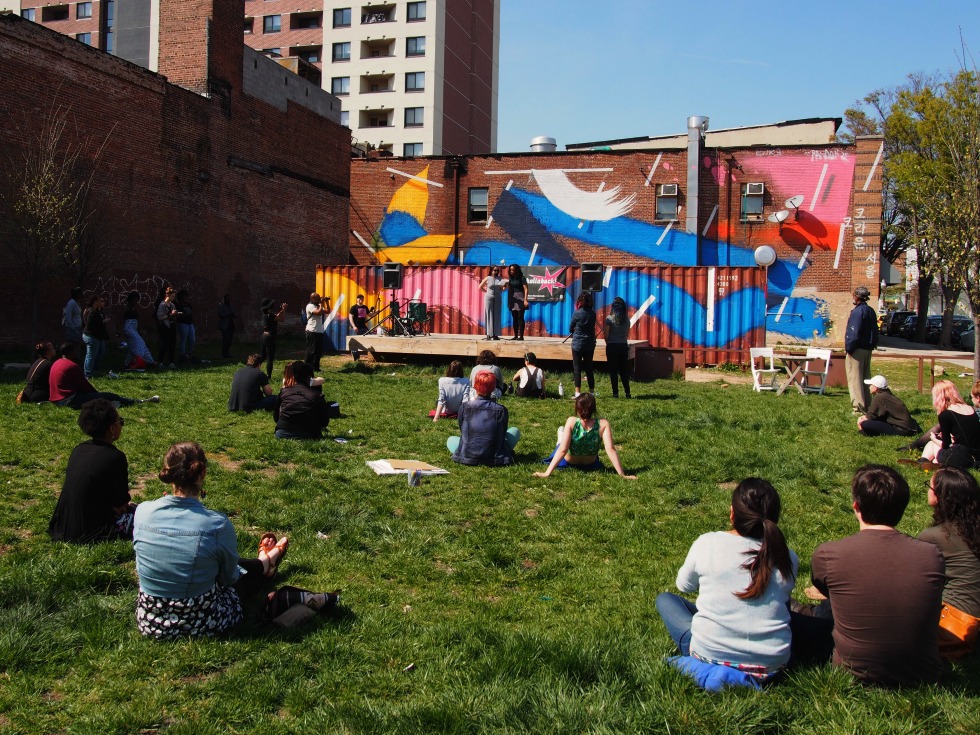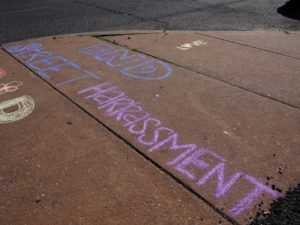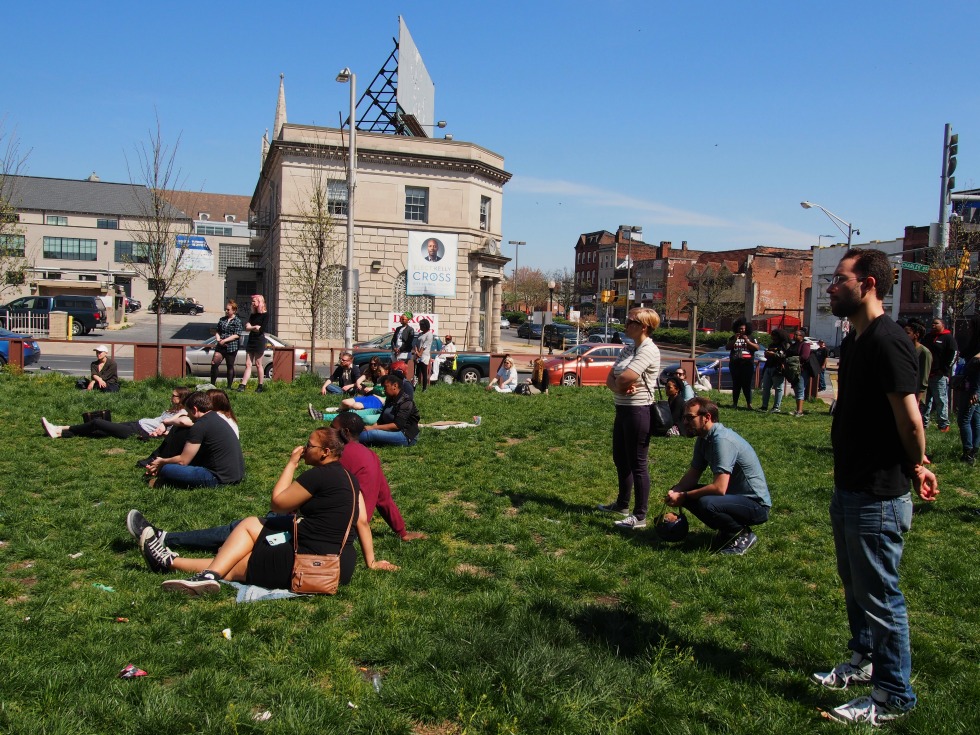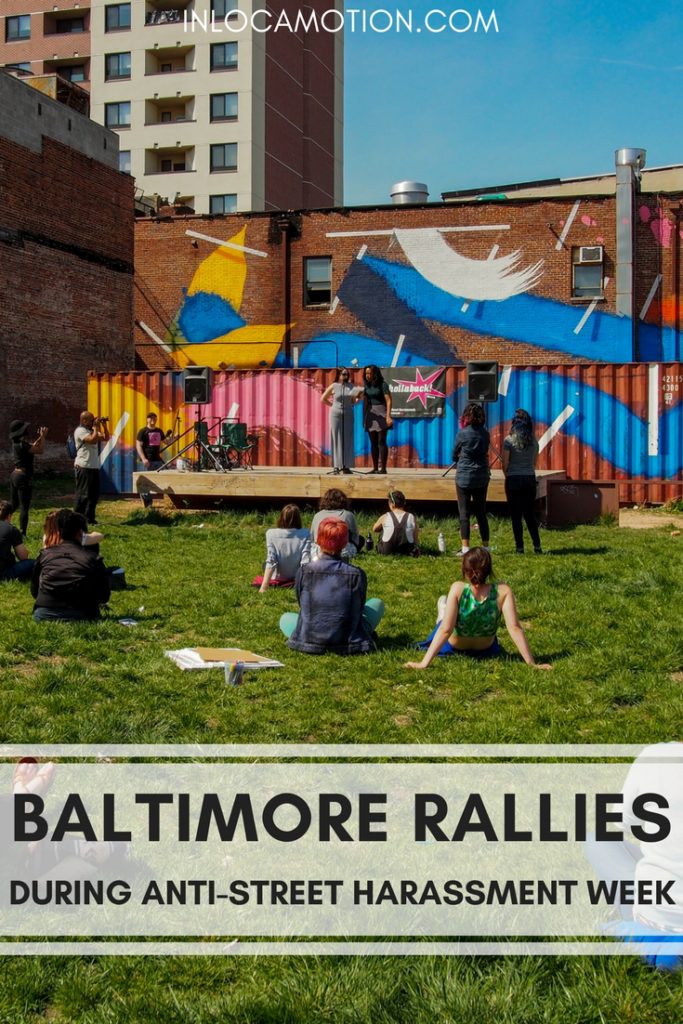
Rally at the Y-Not Lot in Baltimore as part of International Anti-Street Harassment Week
April 16th was a perfect spring day in Baltimore. It was warm and sunny, with clear blue skies. I was on a walk to the Y-Not Lot, navigating through the familiar streets of Station North. On one block, I passed three men. I glanced at them, and they glanced at me. Their gaze lingered. One said, “Hello, gorgeous,” followed by chimes of “Hello, gorgeous” from the other two men. My insides clenched familiarly. Do I ignore? Respond? If I respond, how will they respond? We were alone on this block, just me and these three men. I chose not to respond. Instead, I quickened my pace, their calls of, “Oh, come on, why you gotta be like that?” echoing in my wake.
Ironically, but not surprisingly, this exchange occurred as I was walking to a rally that would tackle this very issue: street harassment. April 10th through April 16th, 2016 marked International Anti-Street Harassment Week, during which time organizations in the United States and abroad worked to raise awareness about the very pressing and global issue of street harassment.
The organization Stop Street Harassment has a succinct working definition of street harassment:
Gender-based street harassment is unwanted comments, gestures, and actions forced on a stranger in a public place without their consent and is directed at them because of their actual or perceived sex, gender, gender expression, or sexual orientation.
Street harassment includes unwanted whistling, leering, sexist, homophobic or transphobic slurs, persistent requests for someone’s name, number or destination after they’ve said no, sexual names, comments and demands, following, flashing, public masturbation, groping, sexual assault, and rape. (Stop Street Harassment, 2015).
Street harassment is a human rights issue. It changes the way that women, LGBTQIA+ people, and gender nonconforming individuals* navigate the streets and impacts our overall feeling of safety in the streets. Street harassment means that our public spaces are not exactly public, but rather are territory controlled by men**. Street harassment exists as a tool to remind women, LGBTQIA+ people, and gender nonconforming individuals of their vulnerability in public spaces and who is really “in charge.” Street harassment in any form is gendered violence. It is fundamentally about power and control, as street harassment involves the sexual objectification of a person without their consent.
In spite of what we have been taught, being catcalled is not a compliment. Catcalling and other forms of street harassment are critical issues because they exist as part of a spectrum of violence. Women, LGBTQIA+ people, and gender nonconforming individuals have been assaulted, raped, and killed for refusing or ignoring men’s advances that began as “simple” catcalling in the street. If we disregard street harassment as a non-issue, then we accept a culture in which violence against women, LGBTQIA+ people, and gender nonconforming individuals is seen as normal. This is a fallacy. To push back against this normalized culture of violence, we rally.
The rally in Baltimore
In Baltimore, we did our part to raise awareness about street harassment by rallying in Station North. The rally was organized by Hollaback! Baltimore, a local branch of the national organization dedicated to ending harassment in public spaces, and the Collective Action for Safe Spaces, a Washington, D.C. organization working to combat street harassment in the greater D.C. area.

End street harassment! Enough said.
The Anti-Street Harassment Week rally was not a march through the streets. Instead, it was a gathering that involved a variety of speakers. Each speaker took to the stage in the sunny Y-Not Lot and spoke to us about different topics related to street harassment.
Street harassment is not only pervasive, but it is also a problem with many intersections. It affects the majority of women, but street harassment and gendered violence are particularly prevalent for women of color, LGBTQIA+ people, and gender nonconforming individuals.
The speakers at the Baltimore rally reflected the broad range of individuals who are susceptible to street harassment. For example, Bryanna Jenkins of the Baltimore Transgender Alliance gave a powerful speech about the disproportionate violence faced by trans people, especially trans women and trans women of color, in the streets, and Jessica Raven of the Collective Action for Safe Spaces spoke about the objectification and hypersexualization of black women’s bodies in the context of street harassment.
As an observer in the crowd, listening to all of these speakers was simultaneously educational, chilling, empowering, and validating. The rally provided us with resources: facts and statistics regarding the occurrence of street harassment, insight as to how other victims of street harassment have dealt with their harasser(s), and even resources for men in working to combat street harassment.

“Women are not outside for your entertainment”; “My outfit is not an invitation” – wheat-pasted posters on North Avenue in Baltimore (posters by artist Tatyana Fazlalizadeh)
Street harassment is a problem in any space in which there exists a sense of entitlement over another person’s body. This entitlement teaches men that it is their right to objectify and dehumanize women, LGBTQIA+ people, and gender nonconforming individuals, and that it is the consequence of being a woman, LGBTQIA+, or gender nonconforming that we must bear with verbal and/or physical violence. We rally to combat this, as no human should be subject to violence simply for existing.
Additionally, the rally in Baltimore and other similar spaces not only function as tools of education, but also create safe spaces for victims of street harassment. We live in a world that teaches women, LGBTQIA+ people, and gender nonconforming individuals that we are responsible for the violence perpetuated against us. We are taught the thousand and one ways to “avoid” verbal and/or physical violence. We are taught to be aware of what we wear, where we walk, with whom we walk, what time of day it is when we’re walking, with whom we make eye contact, if it’s dark outside, if the area is unfamiliar, if we look “provocative”… as if somehow, if every woman, LGBTQIA+ person, or gender nonconforming individual were to follow some sort of magic formula, that we would be immune to street harassment and gendered violence, but if we happen to transgress one of the innumerable variables in this formula, then it’s our fault.
Conversely, the rally created a safe space of people who could sympathize with the fear of violence and/or the violence itself that one can face as a woman, LBGTQIA+ person, or gender nonconforming individual. I found it valuable to be in a space such as this, in which it was understood that gendered violence is not tolerable, it is not natural, and it is not the victim’s fault. In that sense, this rally and other similar spaces are multi-functional, as they further education about these important issues and create safe spaces for victims.
I found the Baltimore rally to be educational and empowering, and I hope that the space felt safe and inclusive for everyone there. I believe that any education and awareness on this topic is important. This is not easy work – discussing street harassment and its related issues can be triggering, traumatic, and disheartening, especially when we think about how much work there is to be done. However, I am grateful to the speakers for their empowering words, for taking to the stage and refusing to acquiesce to a violent culture, for refusing to be silent, for sharing their strength with us in spite of a culture that tries to disempower us, and for letting us know that we are not alone.

Listening and learning
Resources in Baltimore and beyond
Additional speakers and organizations represented at the Baltimore Anti-Street Harassment Week rally, in addition to the organizations mentioned above, include:
War On Women, The West Family Coalition, FORCE: Upsetting Rape Culture and The Monument Quilt, the Black Feminism Reading Group, Rainbow Umbrella, Le Angry Bonnet Chronicles, the Greater Baltimore Leadership Association, Dynamik Entity (spoken word artist), and Elizabeth Doerr (blogger).
Here are some additional resources that go into greater detail about street harassment and related issues:
- Why we need to take street harassment seriously
- I Can’t Believe I’m Writing This: Street Harassment Is Not A Compliment
- A Hollaback Response Video: Women of Color on Street Harassment
- Calling Out Race in Street Harassment
- Replacing Sexism With Racism Is Not A Proper Hollaback
- ‘What I Wanted to Wear’ Lays Bare Transphobic Street Harassment
- Street Harassment: Not Just A Cisgender Issue
- 7 Responses To Mansplanations About Street Harassment
- Tatyana Fazlalizadeh’s street art tackles street harassment
- I Stopped Telling Women to Smile (and You Should, Too)
- Men Behaving Badly – Street Harassment and Cat-Calling
Notes:
*In this post I use “women, LGBTQIA+ people, and gender nonconforming individuals” in an attempt to use the broadest and most inclusive language that describes the potential victims of street harassment. Other victims of street harassment exist, though I define victims of street harassment as such because street harassment is most pervasive and dangerous for marginalized groups. If there are any terms/language that I can add to be more inclusive, please let me know.
**In this post I use “men” to describe those who typically street harass. Obviously, not all men street harass and street harassment can perpetuated by those other than men, but due to dynamics of power and privilege I use the term “men” in this post to hold men accountable in calling each other out and working towards a less violent world.










2 comments
Im grateful for the article post. Will read on…
I’m glad that you found it helpful!!